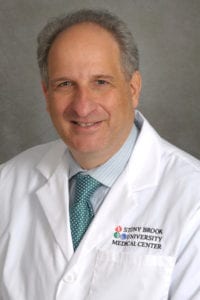Most people only think about Lyme disease when taking a hike in a park, but for many doctors, the condition weighs heavily on their minds every day.
Dr. Benjamin Luft, director and principal investigator of Stony Brook WTC Wellness Program, is one of those doctors. He is currently working on two clinical studies examining the disease. One involves those who continue to present symptoms after being treated, and the other study involves Latinos on Long Island who work in the landscaping and agricultural fields.
In a recent phone interview, Luft said the clinical study involving Latinos is a straightforward one, where the aim is to help a population that has been underserved and understudied due to their work schedules. The other study is more involved.
After being bitten by a tick infected with a bacterium called Borrelia burgdorferi, many people with a bull’s eye rash or flulike symptoms may receive treatment and feel better; but there are those who will continue to suffer for a prolonged period, even years, with a variety of complaints like aches, pains and brain fogginess. Luft said at times there may be no clear signs of the disease in the body, but doctors may find evidence of it after thorough neuropsychological exams that can detect subtle abnormalities.

“This study is really geared toward diagnosing and to find ways to be able to monitor the disease,” Luft said, adding in the future his hope is to conduct studies testing new ways to treat Lyme disease.
The doctor said it’s essential to receive a diagnosis because if Lyme disease is left untreated, it can lead to joint swelling, arthritis, neuropathies, meningitis or cardiac problems.
When Stony Brook University recently began making a more significant investment in its imagining facilities, Luft said he saw a chance to find an answer for those with chronic symptoms.
“I thought this is the opportunity to see what is going on in the brain of these patients with using X-ray techniques and radiological techniques which may give us some insight,” he said.
He said with cutting-edge neuroimaging studies researchers can look for evidence of inflammation in the brain which may be a reaction to the infection.
“That would be an important thing to do because it may give us another target for therapy,” Luft said. “A lot of the therapy that we now use is really just geared toward the organism itself, but it’s not really geared toward the body’s reaction to the organism which may also have to be treated in order to alleviate some of these symptoms.”
The doctor has studied Lyme disease for more than 30 years. When he arrived at SBU from Stanford University Hospital, he was involved in work with AIDs and age-related diseases, but he said at the university’s clinic in the 1980s many people complained of Lyme disease problems and there were no effective therapies at the time. Many of the first therapies and treatments used today were developed at SBU, he said, but there have always been people who haven’t responded well to those treatments.
“So that’s been something that’s been bothering me for many years as to why that is,” Luft said.
He said he will present initial data, which is promising, from the clinical imagining study at a conference in Barcelona, Spain, later this month and hopes to get more patients for the clinical study. Those who are interested can call 631-601-5615. Subjects must meet stringent criteria including not having any other disease, having serological evidence of Lyme disease and a clear history that they had the rash.
In addition to Luft’s studies, Dr. Christy Beneri, assistant professor of pediatrics at SBU, and her team are working on a pilot study to look at newer diagnostic tools to establish a better way to diagnose early Lyme disease.
“We also will be doing work on understanding tick epidemiology in our area and working with the local health department to understand potential new tick-borne pathogens,” Beneri said.
Stony Brook Lyme Disease Laboratory has been performing Lyme disease testing on clinical specimens since 1984. Both inpatients and outpatients can have a Lyme ELISA screening test and Western blots confirmatory test at Stony Brook Medicine. Almost 10,000 screenings were done in 2017 at the hospital, which has been actively working with state senators for funding for Lyme disease outreach and research, according to Beneri.





